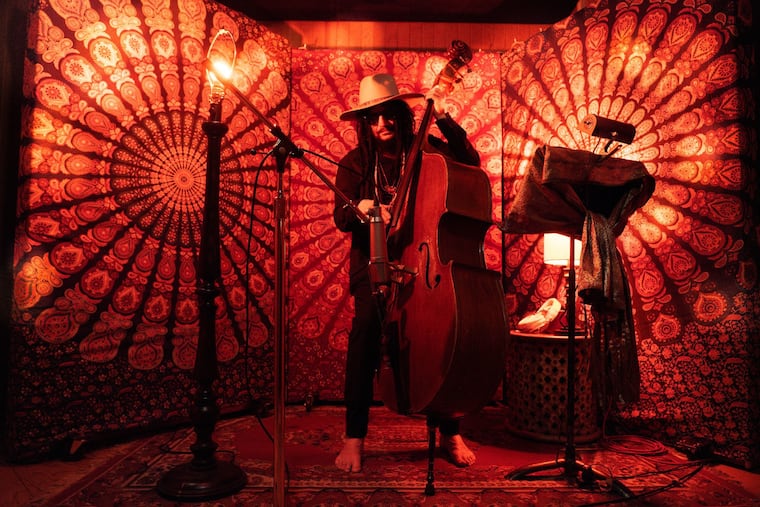Proud Detroiter Don Was is convinced the Deadheads in Philly are different
But the six-time Grammy-winning producer isn’t quite sure how to describe his new band.

It’s hard to know where to start when describing the multifarious identities of Don Was. Since the early ‘80s, he’s forged several parallel careers, any one of which would be sufficient to fill most artist’s bios.
He was one of the two masterminds behind the funky, eclectic pop-rock-R&B-dance-jazz band Was (Not Was), best known for the MTV-era hit “Walk the Dinosaur.” He’s a six-time Grammy-winning producer who’s worked with Bonnie Raitt, the Rolling Stones, the B-52s, Bob Dylan, Willie Nelson, and countless others.
Since 2012 he’s also been the president of the legendary jazz label Blue Note Records. That’s not to mention his work as a documentary filmmaker, music director, and sideman, or his occasional tours with the Grateful Dead’s Bob Weir and others.
So it’s no surprise that even Was is at a loss to pin down his latest band, the Pan-Detroit Ensemble, which will play the Ardmore Music Hall on Sunday as part of “Unlimited Devotion,” a weekend-long celebration of the Grateful Dead.
“I wouldn’t know where to put this in a record store,” Was said over the phone last week from Detroit. “I can identify all the roots of it, but it defies conventional marketing wisdom.”
The group, as its name implies, draws together a cross section of Motor City musicians, including longtime Was (Not Was) members Dave McMurray on saxophone and Luis Resto (also an Eminem collaborator) on keyboards. The wide-ranging repertoire mixes new original compositions with reimagined tunes from the Was (Not Was) catalog and pieces by jazz musicians like Yusef Lateef, Olu Dara, and Henry Threadgill.
Naturally, Sunday’s show will also delve into the Grateful Dead songbook.
The Pan-Detroit Ensemble’s set will be preceded by an all-star group dubbed Stella Blue Note, with Was and McMurray joined by guitarists Steve Kimock and Anders Osborne, Disco Biscuits keyboardist Aron Magner, drummer Jeff Canady, and percussionist Mahindi Masai. Was expects an appreciative audience given his recent visit to the Met with Wolf Bros, his trio with Bob Weir. “Even the Deadheads seem different in Philly,” he said. “They really seem to be open-minded and just dig music.”
Asked about launching a new project with musicians that he’s known for four decades, Was recounts the first time he met fellow Detroiter Stevie Wonder. Was, enlisted to lead a band backing Wonder for a TV appearance, had been allowed into the soul icon’s dressing room for just a moment to discuss the performance. When his time was up, Wonder intervened.
As Was recalled, “Stevie said, ‘No man, let him stay. He sounds like home.’ It just had to do with the way I was hitting the consonants. I sounded like a guy from Detroit, and it made him feel comfortable and at ease. It’s the same with music. When I start playing with these guys, everyone is automatically in the same place and it’s a great feeling.”
Reconnecting with the music and musicians of his Detroit roots is not an act of nostalgia for Was, but an acknowledgment that the city helped to define him as an artist. He grew up at a time when formative bands from a number of diverse genres were making their names on the local scene.
“What I’ve learned after years of producing,” he said, “is that the thing that makes you different from everybody else is your superpower. My strength is that I went to the Grande Ballroom and saw the MC5 and the Stooges. Funkadelic played a sock hop at my junior high school. Even when I was under age, I could stand outside of the Drome Lounge and try to hear Coltrane wafting out. I remember going to see members of the MC5 jamming with Pharoah Sanders’ band one night at [poet and activist] John Sinclair’s printing headquarters. It was music that you never heard in your life, before or since.”
It was because, Was said, Detroit was a one-industry town; the automobile factories bringing workers from all over the country to the city in the aftermath of World War II. “They brought their cultures with them, so we grew up in this jambalaya of different styles and different approaches to music, and often heard them blended.”
Even when his name is on the marquee, as it will be on this tour, Was appears less interested in being the center of attention than he does facilitating the creation of something special. It’s the one trait that applies across his career, whether it’s convincing Ozzy Osbourne to rap with Was (Not Was) or seeking out new artists for the Blue Note roster.
“I’m in it for the adventure,” Was concluded. “Whether you do it in the studio or you do it live, I don’t know anything more rewarding than the collective ecstasy that comes from everyone being swept away. The idea is to take the history and use it to make the future.”
“Unlimited Devotion” runs for three nights, Friday, May 31, to Sunday, June 2, Ardmore Music Hall, 23 E. Lancaster Ave., Ardmore. ardmoremusichall.com